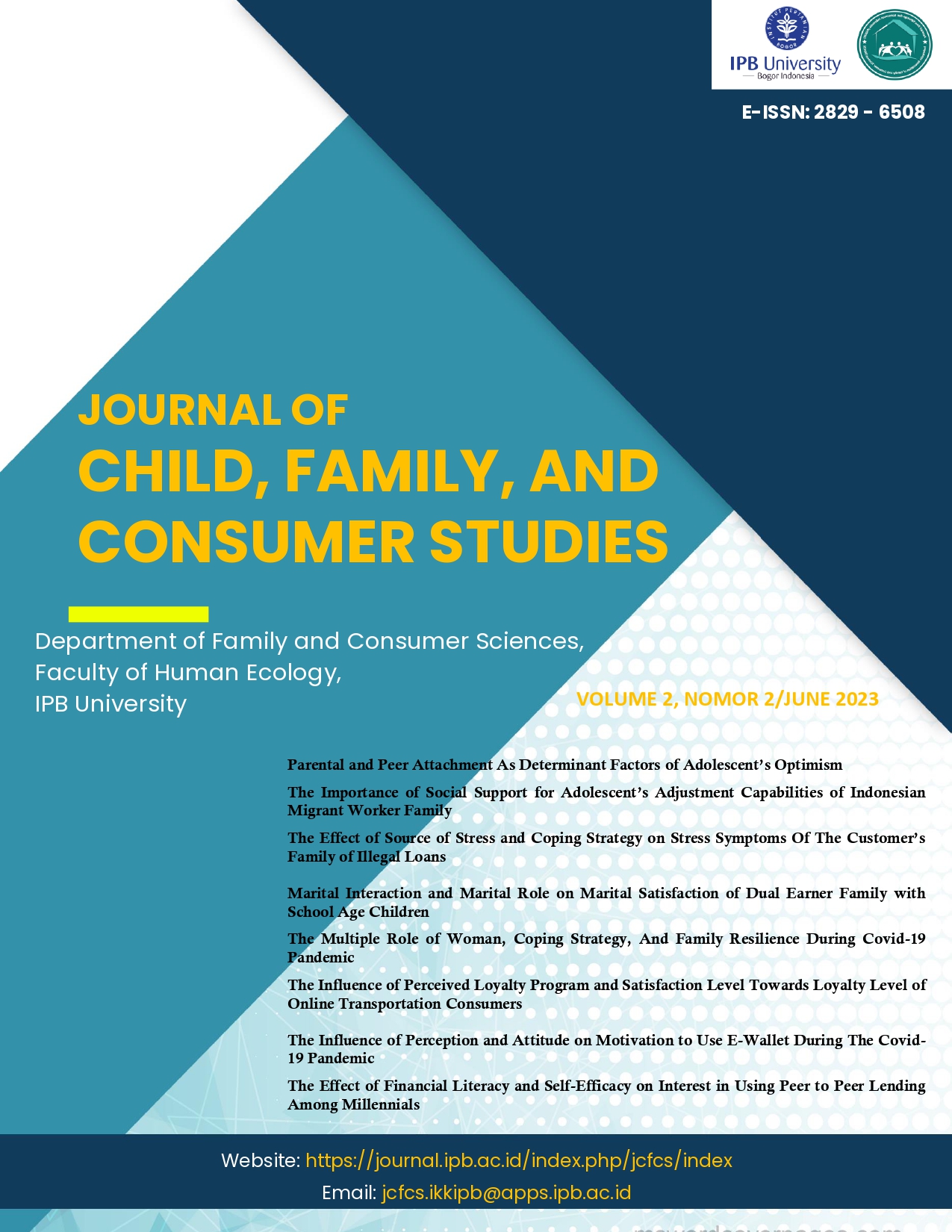THE MULTIPLE ROLE OF WOMAN, COPING STRATEGY, AND FAMILY RESILIENCE DURING COVID-19 PANDEMIC
Abstract
The Covid-19 pandemic has disrupted family life mechanisms, especially families with multiple roles of women. The purpose of this study is to analyze women's dual roles, coping strategies, and family resilience during the Covid-19 pandemic. This study involved 100 mothers working in the formal sector who have school-age children (elementary school). The research location is in the Bogor Regency area, West Java. Sampling was conducted by non-probability sampling using voluntary sampling technique. The data obtained were then processed using Microsoft Office Excel 2010 software and analyzed using the Statistical Package for Social Science (SPSS) 25 program. Data processing was carried out using descriptive analysis, correlation analysis, and regression analysis. The results showed that there was a significant relationship between family characteristics, women's dual roles, coping strategies, and family resilience. The regression test results show that women's dual roles have a positive effect on family resilience. It is expected that families with dual roles of women can increase their contribution in the public environment through various activities such as PKK (Family Welfare Development), committees for celebrating holidays, community organizations and others. further research is expected to examine the dual role of women through two perspectives, namely the husband's side and the wife's side so that the data produced is more accurate.
References
Asra, E. M. (2013). Hubungan antara work-family conflict dengan prestasi kerja pada perawat wanita. Jurnal Psikologi, 1(1).
Beasley, M., Thompson, T., & Davidson, J. (2003). Resilience in response to life stress: the effects of coping style and cognitive hardiness. Personality and Individual differences, 34(1), 77-95.doi:10.1016/S0191-8869(02)00027-2.
Bhangoo, J. K. (2015). Coping strategies: a study among working couples. Indian Journal of Psychological Science, 5(2), 91-101.
[BKKBN] Badan Kependudukan dan Keluarga Berencana Nasional. (2005). Keluarga Berencana dan Kesehatan Reproduksi. Jakarta: BKKBN.
[BPS] Badan Pusat Statistik. (2018). Keadaan Ketenagakerjaan Indonesia Agustus 2018. Jakarta: BPS.
[BPS] Badan Pusat Statistik. (2019). Keadaan Ketenagakerjaan Indonesia Agustus 2019. Jakarta: BPS.
[BPS] Badan Pusat Statistik. (2020). Laporan Eksekutif Keadaan Angkatan Kerja Provinsi Jawa Barat Agustus 2020. Jakarta: BPS.
[BPS] Badan Pusat Statistik Kabupaten Bogor. (2021). Kabupaten Bogor Dalam Angka 2021. Bogor: BPS Kabupaten Bogor.
Christine, W. S., Oktorina, M., & Mula, I. (2010). Pengaruh konflik pekerjaan dan konflik keluarga terhadap kinerja dengan konflik pekerjaan keluarga sebagai intervening variabel (studi pada dual career couple di Jabodetabek). Jurnal Manajemen dan Kewirausahaan, 12(2), 121-132.doi:10.974 4/jmk.12.2.pp.
Folkman, S., Lazarus, R. S., Dunkel-Schetter, C., DeLongis, A., & Gruen, R. J. (1986). Dynamics of a stressful encounter: cognitive appraisal, coping, and encounter outcomes. Journal of personality and social psychology, 50(5), 992-1003.
Ginanjarsari, G. (2010). Hubungan antara tipologi keluarga dengan komponen ketahanan keluarga pada keluarga miskin dan tidak miskin [skripsi]. Bogor: Institut Pertanian Bogor.
Handayani, R. (2020). Multi peran wanita karir pada masa pandemi Covid-19. Jurnal Kajian Gender dan Anak, 4(1), 1-10.doi:https://doi.org/10.24952/gender.v4i1.2830.
Handriyanti, A. D. (2016). Keluarga dual earner di kota bogor pernyataan mengenai skripsi dan sumber informasi serta pelimpahan hak cipta [skripsi]. Bogor: Institut Pertanian Bogor.
Herawati, T. (2012). Manajemen sumber daya keluarga dan ketahanan keluarga peserta program pemberdayaan masyarakat di pedesaan [skripsi]. Bogor: Institut Pertanian Bogor.
Herawati, T., Krisnatuti, D., & Rukmayanti, I. Y. (2012). Dukungan sosial dan ketahanan keluarga peserta dan bukan peserta program nasional pemberdayaan masyarakat (PNPM) mandiri. Jurnal Ilmu Keluarga & Konsumen, 5(1), 1-10.doi:https://doi.org/10.24156/jikk.2012.5.1.1.
Holijah, H. (2020). Konflik Peran Ganda Wanita Bekerja Di Luar Rumah Terhadap Ketahanan Ekonomi Keluarga Perspektif Hukum Islam. Al-Ahwal: Jurnal Hukum Keluarga Islam, 12(1), 56-64.doi:10.14421/ahwal.2019.12105.
Hurlock, E. B. (1980). Suatu Pendekatan Sepanjang Rentang Kehidupan. Jakarta: Erlangga.
Ismanto A, Suhartini E. 2014. Beban ganda wanita karir di PT. PJB UP Paiton. Artik. Ilm. Has. Penelit. Mhs. I(1):1–5.
Lazarus, R. S. (1993). From psychological stress to the emotions: a history of changing outlooks. Annu Rev. 44(1):1–21.
Lazarus, R. S. (1999). Stress and emotion: A new synthesis. New York: Spinger.
Maclean, H., Glynn, K., & Ansara, D. (2004). Multiple roles and women's mental health in Canada. BMC women's health, 4, 1-9.doi:10.1186/1472-6874-4-s1-s3.
Majid, F., & Handayani, H. R. (2012). Faktor-faktor yang mempengaruhi keputusan perempuan berstatus menikah untuk bekerja (Studi kasus Kota Semarang). Diponegoro Journal of Economics, 1(1), 242-250.
Mayordomo, T., Viguer, P., Sales, A., Satorres, E., & Meléndez, J. C. (2016). Resilience and coping as predictors of well-being in adults. The Journal of psychology, 150(7), 809-821.doi:10.1080/00223980.2016.1203276.
Rosaldo, M. Z., Lamphere, L., & Bamberger, J. (1974). Woman, culture, and society (Vol. 133). Stanford University Press.
Yadollahi, M., Paim, L., Othman, M., & Suandi, T. (2009). Factors affecting family economic status. Eur. J. Sci. Res. 37(1):94–109.
Nordenmark, M. (2004). Multiple social roles and well-being: a longitudinal test of the role stress theory and the role expansion theory. Acta Sociologica, 47(2), 115-126.doi:10.1177/0001699304043823.
Nurillah, H. (2013). Strategi koping, tekanan ekonomi, dan ketahanan keluarga di kawasan kumuh [skripsi]. Bogor: Institut Pertanian Bogor.
Puspitawati, H. (2017). Gender dan Keluarga : Konsep dan Realita di Indonesia. Pertama A, Putra AT, Nurdiansyah MA. Bogor: IPB Pr.
Rahma, A., Puspitawati, H., & Herawati, T. (2015). Pengaruh peran gender dan pemeliharaan lingkungan mikro terhadap kesejahteraan subjektif keluarga petani dataran tinggi. Jurnal Ilmu Keluarga & Konsumen, 8(2), 69-79. https://doi.org/10.24156/jikk.2015.8.2.69
Sholihah, F. V. (2013). Manajemen sumber daya keluarga dan ketahanan keluarga lanjut usia [skripsi]. Bogor: Institut Pertanian Bogor.
Skinner, E. A., & Zimmer-Gembeck, M. J. (2009). Challenges to the developmental study of coping. New Dir. Child Adolesc. Dev. 2009(124):5–17.doi:10.1002/cd.239.
Smyth, I., & Sweetman, C. (2015). Introduction: Gender and resilience. Gender & Development, 23(3), 405-414.doi:10.1080/13552074.2015.1113769.
Sunarti, E. (2001). Studi ketahanan keluarga dan ukurannya telaah kasus pengaruhnya terhadap kualitas kehamilan [skripsi]. Bogor: Institut Pertanian Bogor.
Thompson, P. A., & Schrodt, P. (2015). Perceptions of joint family storytelling as mediators of family communication patterns and family strengths. Communication Quarterly, 63(4), 405-426. doi: 10.1080/01 463373.2015.1058286.
Walsh, F. (2020). Loss and resilience in the time of COVID‐19: Meaning making, hope, and transcendence. Family process, 59(3), 898-911.doi:10.1111/famp.12588.










